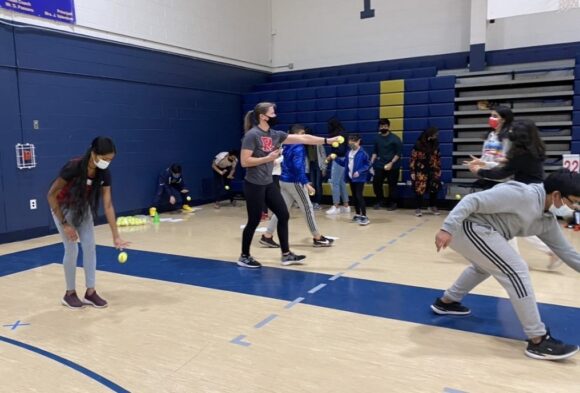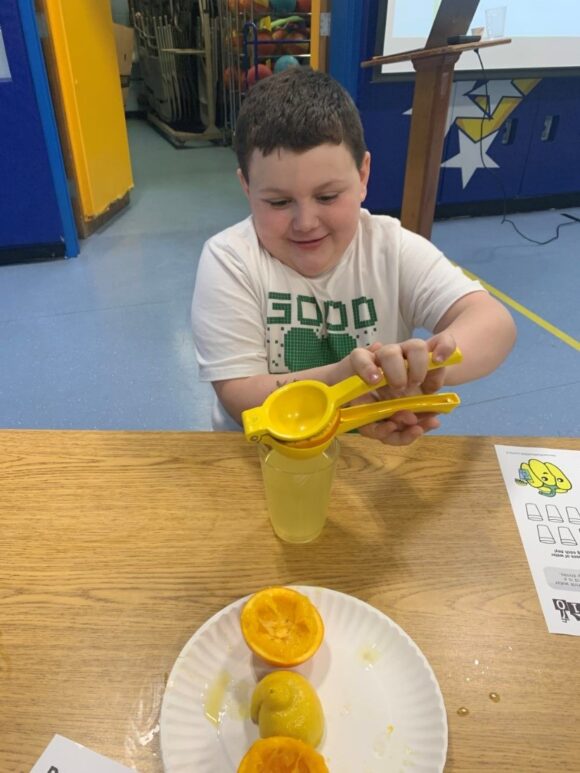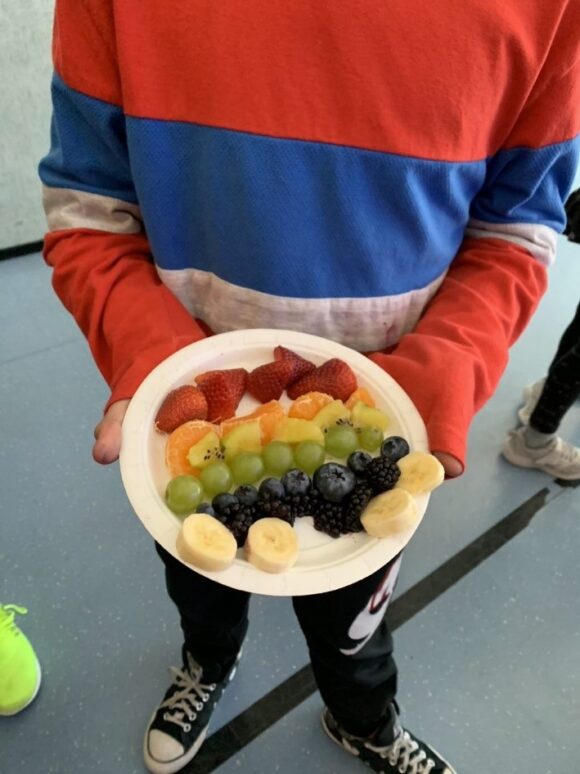
Pictured in Rutgers “R” shirt, Traci McCarthy, RCHSP Physical Literacy team lead, puts the students through their paces in a coordination exercise.
The Rutgers Culture of Health School Program (RCHSP), which was established with a $100,000 grant from the The Horizon Foundation for New Jersey, was launched in the Edison Township Public Schools in February this year. A community outreach initiative under the New Jersey Institute for Food, Nutrition, and Health, RCHSP fosters and promotes lifestyles centered around physical activity and nutritional literacy, and is a joint endeavor of the New Jersey Healthy Kids Initiative (NJHKI) and the Department of Family and Community Health Sciences (FCHS), a unit of Rutgers Cooperative Extension (RCE).
Erin Comollo GSE’19, program development administrator for NJHKI, and Sara Elnakib CC’07, SPH’13, RBHS’21, FCHS educator and department head, RCE of Passaic County, serve as co-principal investigators of the grant establishing the RCHSP.
Horizon Foundation previously awarded an $100,000 grant to support a NJHKI collaboration with IFNH’s Center for Health and Human Performance (now the Center for Exercise and Metabolism) to host field trip experiences for local school students to learn about fun ways to stay physically active. The success of the initial project led to this second Horizon Foundation grant that enabled a nutrition education component, facilitated by FCHS, to be added.

A second-grade student learns how to juice a lemon to make a hydrating drink.
RCHSP educates children and adolescents about the importance of making informed food choices and providing them with resources to develop healthy eating and physical activity habits. To support these goals, RCHSP staff developed six Physical Activity and six Nutrition lesson plans for grades K-2, and six Physical Activity and six Nutrition lesson plans for grades 6-8 grade, all to New Jersey Health and Physical Education Core Content Standards.
For the past two years, the COVID-19 pandemic delayed the full implementation of RCHSP, which instead pivoted to a virtual format to continue delivering fitness and nutrition programing to students.
“The lessons and activities were adapted into scripts, and the scripts were turned into Rutgers-produced videos. Each has a short video lesson and accompanying physical activities or cooking demos. Some nutrition lessons even include an online video game developed by the RCHSP nutrition staff and Rutgers’ Game Research & Immersive Design (GRID) team. The materials were piloted by local schoolteachers who used them during the 2021 virtual school year,” explained Comollo.
With the return to in-person instruction in fall 2021, RCHSP staff and schoolteachers were eager to implement age-specific, hands-on activities directly into classrooms, launching a series of activities with Edison Township Public Schools’ physical education teachers, Gerald Tenebruso and Emily Hopkins, and 120 students from grades 1, 2, and 6.
RCHSP staff members and Rutgers student volunteers visited the schools weekly to teach lessons during gym classes and model program implementation for the participating classroom teachers.
“As a former classroom teacher, CrossFit Level 2 trainer, and someone who didn’t enjoy fitness until adulthood, I think integrating physical literacy into the school day is important,” said Comollo.
“So often, kids are thrown into games or sports without having the fundamentals of strength, balance, or coordination. These are the kids that I would frequently see struggling to sit for longer durations of time in the classroom, hating gym class or sports, or leading very sedentary lives. I was like that myself – I had such anxiety about gym class because no one ever taught me the coordination skills to throw or catch, yet I was supposed to participate enthusiastically in dodge ball,” she added.
Emily Hopkins, a physical education teacher at John Adams Middle School in Edison, shared her observations of the program.
“The RCHSP has been a great experience, and I’m grateful my students and I had the opportunity to participate in it. The lessons focus on health and physical literacy, which are key concepts for teaching students to live healthy and active lives. The instructors who came into my school were enthusiastic and did a great job delivering engaging lessons to accommodate my class of 61 students, our classroom setting, and my students’ needs. They even provided me with material that I’m looking forward to using with future classes.”
In addition to supporting school-aged students, Lisa Rossman-Murphy, a faculty member in the Department of Kinesiology and member of the RCHSP Physical Literacy team, used the program as an opportunity to expose her undergraduate students to the real-life application of content she teaches in her courses.
“This project provides experiential learning for the Rutgers student volunteers. In the Pediatric Physical Development and Fitness course, students learn the importance of movement opportunities for development and that kids who are more comfortable with movement skills will be more physically active and at less risk of chronic health issues. Through this project, we are witnessing a wide range of physical literacy levels among school children, and we are providing knowledge and opportunities for improvement. I find this very exciting and rewarding.”
Co-PI Sara Elnakib experienced firsthand the impact of the program and through feedback from parents.
“Our experience in Edison has been very positive, with teachers and students expressing their excitement about our program. In fact, one of the teachers mentioned that at a parent-teacher meeting, the parents were sharing what their children told them about the program, and how happy they were Rutgers was providing this program to their children. This is a great example of how partnering with Rutgers Cooperative Extension helps fulfill the land-grant mission of Rutgers University.”

A second-grade student proudly shows a fruit rainbow creation.
Gerald Tenebruso, physical education teacher at the elementary school, particularly appreciated the addition of nutrition lessons to his curricula.
“We are so grateful to Rutgers and the fitness and nutrition classes they brought to our school. The Rutgers staff and students were amazing with our students. Each week our students really looked forward to the nutrition classes as this is something they otherwise would not have been exposed to doing during their normal school year. The lessons were engaging and kid-friendly, making the excitement of the students grow from week to week. I know our students are going to miss this program and all the cooking and snack tasting.”
One of the program highlights was during the “Eat the Rainbow” nutrition lesson, where first and second-grade students learned about the benefits of eating different colored fruits and vegetables. While constructing their fruit rainbows and rockets, a few students mentioned that this was their first time eating blueberries, a native New Jersey produce.
Jennifer Shukaitis, FCHS educator, reflected on the impact of the program.
“I have seen this program transform kids’ knowledge of a range of nutrition concepts in a relatively short amount of time. This program’s ability to fill a gap in learning for these students, as well as provide real-world experiences for Rutgers student interns, demonstrates the potential of hands-on education to impact so many lives in a matter of just weeks.”
Rutgers Culture of Health School Program continues implementation in Greater Brunswick Charter School and Philip’s Academy Charter School in Paterson through the spring.

